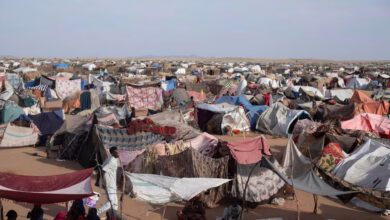Sudan's police used tear gas and batons to break up protests in Khartoum on Monday, witnesses said, after President Omar al-Bashir unveiled tough austerity measures to plug a budget deficit.
Sudan has avoided an "Arab spring" but anger is rising over spiraling food prices among a population strained by years of conflict, poverty and US trade sanctions.
The Arab-African country has been struggling with economic crisis after losing three-quarters of its oil production, the lifeblood of the economy, when South Sudan seceded a year ago.
Protests erupted after news of Bashir's plans to cut the number of civil servants, reduce fuel subsidies and raise taxes on consumer goods, banks and imports.
About 250 students staged an anti-government protest in the heart of the capital for a second day, shouting "rise up, rise up," witnesses said. They also shouted slogans protesting against rocketing food prices.
Riot police tear gassed and beat students hurling rocks at officers on a large street in front of the main campus of the University of Khartoum, witnesses said.
In the suburb Omdurman at the confluence of the Blue and White Nile, policemen beat some 300 student protesters with batons to end the demonstration.
In northern Khartoum, around 100 people set tires on fire to block a large street, shouting "Khartoum, rise up," a witness said, and police officers used tear gas to break up the protest. Activists also reported a student protest in Khartoum but no details were immediately available.
Police said there had been "limited" clashes with students during which several people were detained. "They tried to spark riots and damage citizens' property," a police statement said.
Austerity measures
Bashir told lawmakers in parliament: "We will overhaul the government … cut down the number of ministries … and shrink regional governments by between 45 and 50 percent."
Advisory jobs and allowances for senior officials would be cut altogether, he said.
Fuel subsidies, which diplomats say cost Sudan at least US$1 billion a year, would be gradually phased out, he said, while value added tax and taxes on imports and banking profits would be increased. Taxes on telecoms firms were raised in December.
Bashir, who seized power in a 1989 coup, said the government would soften the blow of higher fuel prices by exempting basic foods such as wheat, flour and sugar from the new import tax.
He gave no details but said Finance Minister Ali Mahmoud, who put the finance deficit at $2.4 billion in May, would brief parliament on Wednesday.
Sudan effectively devalued its currency in May — pushing inflation up to 30 percent — to try to attract more remittances from expatriate Sudanese and to boost gold and farm exports after the International Monetary Fund urged it to take emergency measures to overcome the "daunting" challenges it faces.
Khartoum and other university cities have seen small protests which have so far only attracted students. Opposition politicians said last week they planned to stage protests against removing fuel subsidies.
Khartoum had hoped to fix its deficit with the help of export fees from landlocked South Sudan which needs to pump its oil through northern pipelines and Port Sudan on the Red Sea.
But the new nation in January shut down its entire oil output of 350,000 barrels a day to stop Sudan from seizing oil for what the latter called unpaid export fees. Both sides have been unable to agree on a rate.




